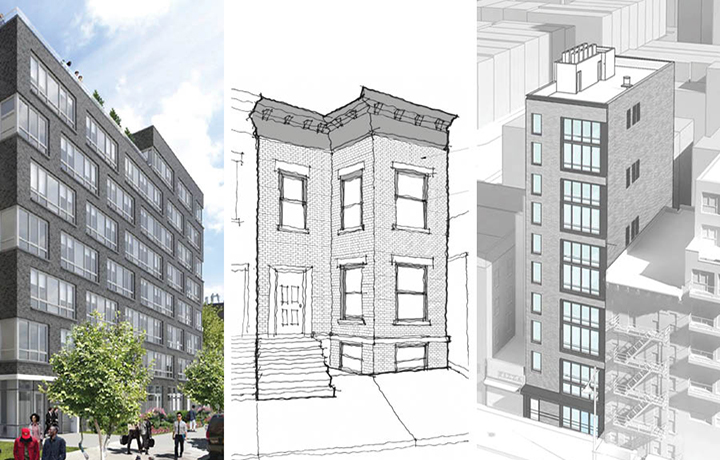Income-targeted housing (also known as affordable housing) is a hot topic of discussion throughout our communities and in the media. Income-targeted housing is based on the idea that families should pay for housing based upon what they can afford. Currently, estimates show that a household shouldn’t have to pay more than 30% of its income towards housing needs, but many families in the borough are paying upwards of 50% and 60% of their monthly income for housing.
As you may know, IMPACCT Brooklyn is dedicated to creating and preserving affordable housing throughout the borough. A large part of this goal is making sure residents are informed about various housing terms, programs, and real estate terminology. Here are four terms used frequently when people talk about affordable housing.
Third Party Transfer
The New York City Department of Housing Preservation and Development’s (HPD’s) Third Party Transfer (TPT) Program improves and preserves affordable housing for low- to moderate-income households by designating qualified sponsors to purchase and rehabilitate distressed vacant and occupied multi-family properties.
Before the Department of Finance starts a third party transfer, HPD reaches out to hundreds of building owners who are candidates for TPT and explains the program and redemption process. They also research all liens and other obstacles to the transfer properties before informing owners of payment options and, if necessary, referring them to assistance programs.
Visit the NYC HPD website to learn more about Third Party Transfer.
Emergency Repair Program
If residential property owners don’t correct emergency violations, HPD can take action to correct the conditions. This includes emergency repair work to address:
- HPD Class C violations and Orders,
- Department of Buildings Orders and/or Declarations of Emergency,
- Department of Buildings referrals of certain Elevator violations,
- Department of Health and Mental Hygiene Commissioner’s Orders,
- Other housing related violations.
If this happens, the building owner is charged for the cost of the repairs.
Because of laws governing procurement, contracting, and wages, this work might be significantly more expensive than the price the owner could obtain himself. If that’s the case, the Department of Finance will bill the property for the cost of the emergency repair, as well as related fees and/or for the cost of sending a contractor to attempt to make repairs. If the owner fails to pay, the City will file a tax lien against the property. The tax lien will bear interest and, if it remains unpaid, may be sold and/or foreclosed to collect the amount owed.
Visit the NYC HPD website to learn more about the Emergency Repair Program.
Deed Theft & Fraud
Deed fraud happens when a fraudulent deed is recorded against a property. In many cases, the owner may not even be aware that a deed was recorded against their property. Deed fraud is a serious crime. The City Register at the Department of Finance reviews documents submitted for recording and reports suspicious activity to the Sheriff’s office for investigation.
To prevent deed fraud, register for the Recorded Document Notification Program online to get notified anytime a document is recorded related to your property. If you are unable to register online, complete and mail an application. Check the City Register’s records often using the ACRIS system to make sure that there are no deeds or mortgages that you are not aware of recorded on your property.
- If your property is not occupied, you should check often to make sure it remains vacant and is not occupied illegally.
- Ask someone you trust to look after your house if you are going to be away for a long period of time.
- Do not let mail pile up if you are going out of town.
- Make sure that the Department of Finance has the correct mailing address for you or the person who should receive notices about your property.
- Contact us if you suddenly stop receiving notices from Finance that you used to get.
- If you suspect any kind of deed fraud, report it immediately.
Click here to learn more about deed theft and fraud.
HDFC Cooperatives (Co-Ops)
In New York City, there are tens of thousands of shareholder-owned affordable homes, which means the people who live in the buildings own their own apartments, in the form of shares. These are Housing Development Fund Corporation Cooperatives, or HDFC Co-Ops for short. These properties make up a significant portion of New York City’s affordable housing ownership.
Incorporated under the Private Housing Finance Law, HDFC co-ops benefit from reduced real estate taxes in exchange for following certain standards for the selling and renting of apartments. HPD can remove this benefit if the agency determines that the owner is violating HDFC’s requirements, so HDFC board members need to be conscious, careful, and ethical when they carry out their responsibilities.
Click here to learn more about HDFC Cooperatives.
Want to learn more about housing in Brooklyn? Stay up-to-date with IMPACCT Brooklyn’s blog posts or sign up for the official IMPACCT Brooklyn newsletter to receive the latest news and information about affordable housing, community organizing, small business opportunities, and more!
